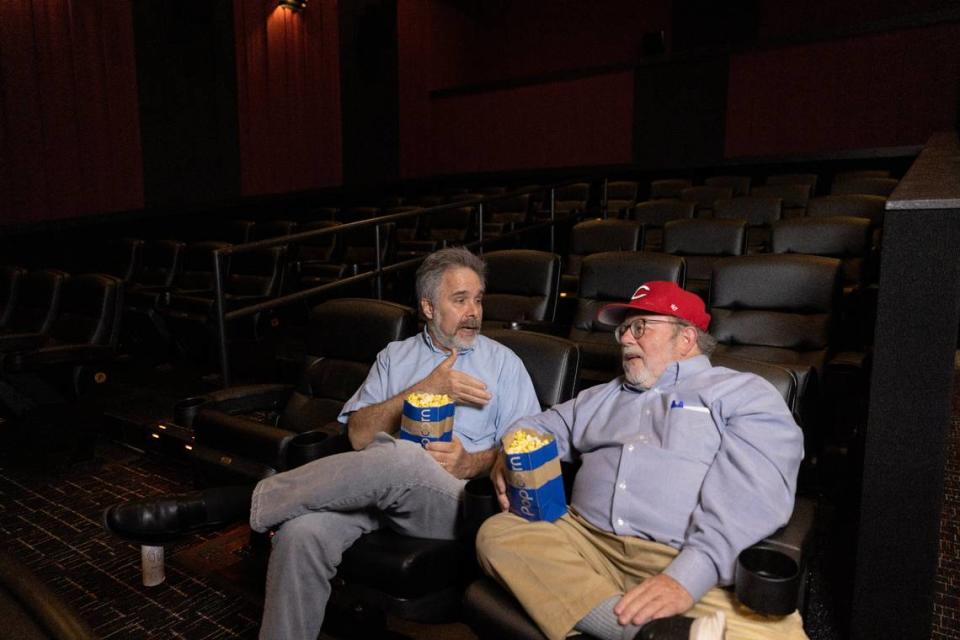Move over, ‘Siskel & Ebert’: These Charlotte retirees have blistering takes on iconic movies
Two 68-year-old retirees are sitting inside an auditorium at Independent Picture House on the edge of NoDa, engaging in cordial armchair criticism of various films, when one of them suddenly says something many movie lovers would find blasphemous.
After casually pointing out that the highest-rated film of all-time on IMDb is “The Shawshank Redemption,” former Charlotte Observer movie critic Larry Toppman starts mocking the 1995 Best Picture nominee: “There’s a scene where they play Mozart in the prison, and all these hardened murderers and rapists put down their tools and listen to the beauty of Mozart soaring over a public address system. And it changes them for a moment,” he says, his voice dripping with sarcasm.
“That is one of the phoniest scenes of all-time in film.”
His movie buddy Tim Funk — a fellow ex-Observer writer — cringes. “I think you tend to dismiss a whole film because of one thing —”
But before he can finish, Larry cuts him off. “Oh, no, no, there’s 40 other phony scenes. I picked that as an example.”
“Well, it’s not a documentary about prison life,” Tim says, sounding a little disgusted. “It’s a great story with some great actors.”
“OK,” Larry says, shrugging, “but everything about it is nonsense.”
It goes on several more minutes, this snippy back-and-forth between Larry and Tim, two guys who bonded over their love of movies for the better part of three decades as newsroom colleagues; who in retirement have continued to regularly see movies together; and who are more than happy to just sit and talk about movies with each other for hours.
Sometimes even civilly.
Well, honestly, probably civilly more often than not. But man, is it fun to listen to them when they argue.

There could be only one (film critic)
Tim and Larry both started writing critically about movies in the 1970s.
Tim says his first byline was a rave review of “The Godfather” that appeared in 1972 in Prep Magazine, a monthly publication by students at St. Xavier High School in Cincinnati, Ohio. Larry, meanwhile, says he positively reviewed the original “Star Wars” for The Press of Atlantic City in May 1977, shortly after the New Jersey publication gave him his first full-time daily-newspaper job. (Larry was hired there as a sportswriter, but also was tasked to write arts and entertainment stories, which he preferred.)
Larry started working at the Observer in 1983 as its theater writer; two years later, Tim landed a position covering politics for the Observer in Raleigh. Then in 1987, longtime Observer film critic Joanne Rhetts announced she was leaving.
Tim, whose passion for movies had continued to grow, expressed interest in applying to fill the spot during a visit to the newsroom in Charlotte. But the feedback Tim got from the editor in charge of filling that spot was simple: “ ‘Larry Toppman has wanted this job since he was a little boy. So he’s gonna get it.’ ” (Larry says, for what it’s worth, that it’d be more accurate to say he had wanted it since college.)
Two years later, in 1990, they became newsroom neighbors, after Tim moved to Charlotte from Raleigh to take over as the Observer’s TV reporter. Then they quickly became friends, after recognizing one another’s passion for cinema.
By the mid-’90s, Larry was regularly inviting Tim to join him for advance screenings of films he was reviewing, and even occasionally letting him tag along while he covered regional film festivals.
The festival field trips eventually stopped due to budget constraints, but their movie dates have continued across four decades.
Since Larry’s long run as a movie writer earned him status as a lifetime member of the Southeastern Film Critics Association, even in retirement he still gets invitations to advance screenings at the big theater chains, and will extend them to include Tim when it seems like a good movie-date opportunity. The two also share a love of art films — Tim has spent years as a board member of the Charlotte Film Society — and can almost always find something that piques their interest at Independent Picture House, which favors indie and foreign fare.
And because Larry is no longer under pressure to rush home and bang out a review for the paper, whenever they’re able to catch a flick together they can hang out long after the credits have rolled to discuss it on a level that the average moviegoer cannot. On a level that reminds some, in fact, of history’s most famous pair of film critics.
As Tommy Tomlinson, yet another former Observer staffer, described Tim and Larry to us recently:
“Two retired movie lovers playing out their own little Siskel and Ebert thing for no one’s enjoyment but their own.”

‘In a canoe trip going down a river’
The contrasts between the two professional-turned-armchair critics are stark.
Tim needs a little more time to let his views marinate, and sometimes seems to start a comment about a movie without knowing how that comment is going to end. Larry can formulate an articulate opinion about a film in a span of microseconds after seeing it, and has an endless supply of clever analogies to reinforce his points.
Larry has no qualms about getting up and walking out in the middle of a screening, if he feels bombarded with gratuitously over-the-top violence, or if he simply has no interest in seeing where it’s headed. Tim will always stay for the whole thing.
Tim is much more open to “popcorn” movies — loved “Top Gun: Maverick,” for instance. Larry didn’t see that Tom Cruise sequel, and explained why by saying reviewing movies isn’t his job anymore, so “I simply don’t see anything I don’t want to see.”
It’s as entertaining to listen to them talk about their approaches to movie-going as it is to hear them dissect the actual movies.
“I go to a movie and I want to like it,” Tim says, “because why not?”
“And I go in,” Larry says, “thinking, Well, maybe. I’m curious. Go ahead. Take your shot. ... I’m willing to make this trip with you. But you better make it interesting. And if it’s not interesting, I have other things to do with my life. I’m either gonna get up and go, or at the end curse myself for staying. It’s not a tough attitude of, Show me, you punk! It’s more like, Well, do you have something to say? I’d like to hear it if you do. But you really have to have something to say.
“I try to meet a movie part way, but I don’t go very far toward meeting it.”
Tim counters: “There are very few movies that are really, really bad and have no redeeming value. So I tend to stay around because it helps my encyclopedic knowledge of movies, for one thing. I mean, if the drama isn’t as compelling as I’d like it to be, I might focus on the history that’s in there. I might focus on the performances. ‘Oh, I really like this actor. This is not a very good film, but I really like his acting.’ Or the director. ‘This may not be his greatest film, but I’ve seen all his other ones, so I’d like to be able to say I’ve seen this one, too.’ ”
To summarize their personalities, Larry — of course — has one of his clever analogies ready:
“If we were in a canoe trip going down a river, I bet you that Tim would go, ‘Beautiful river ... lovely foliage, stuff to look at, the water is really nice.’ And I’d be going, ‘The water’s really — oh, hit a rock. Oh, it’s really pretty out here. This is nice, and boy, the trees are great and — ow! Ow! An insect just stung me.’ ”
Tim pitches forward, laughing.

Critiquing a film until closing time
It’s July 13th, opening night at the Independent Picture House for “The Miracle Club,” a movie starring Maggie Smith, Kathy Bates and Laura Linney about a group of women making a pilgrimage from Ireland to Lourdes in France.
Tim — a practicing Catholic who traveled to Lourdes for the Observer in 1997 as its then-religion reporter — picked this one, curious about its depiction of faith and of the sacred French town. Larry, who rolled his eyes at the schmaltzy trailer, would have happily skipped it.
Still, Larry went in, he says, with an open mind. He came out, however, swinging.
As the credits roll, Larry leans toward Tim and seems to be trying to sound as un-sarcastic as possible when he asks, “Those are supposed to be Kathy Bates’s children at that table, right?” He’s referring to the fact that the woman played by Bates (who he’ll later Google to confirm is 75 years old) is depicted as having a child just barely elementary-school-age among her brood of six.
Tim immediately throws up his hands. “Well, here we go again. Focusing on logic instead of just —”
“It’s not logic,” Larry interrupts. “It’s miscasting. Kathy Bates is miscast. Kathy Bates did a good job as a performance. But she’s the wrong person for that role. She’s too old to have a 6-year-old kid.”
“So,” Tim shoots back, “does that mean you would have given the film a B, and now you’re gonna give it a C just because she was too old to have a 6-year-old kid?”
There’s a group of women a few rows further up, one of whom chatted with Larry briefly before the show. “We’re waiting on Mr. Toppman’s review,” she says.
“It was surprisingly touching,” Larry says. He just can’t let it go, though. “I think Kathy Bates was badly miscast, because ... those were her six kids around the table, including basically a kindergartner. That’s a miracle,” he quips, playing off the title of the film, as the women howl with laughter.
The women make their way towards the exit, but Larry and Tim keep going back and forth about the movie even after the projector stops, the lights come up, and one of the theater staffers comes in and starts sweeping up.
Tim keeps hammering on things he liked, and as the conversation goes on, Larry occasionally concedes a point to Tim regarding something Tim considers a merit of the film. Larry, meanwhile, continues to list the many things he didn’t like, and as they continue their discussion, Tim occasionally concedes a point to Larry about something Larry perceives as one of the film’s flaws.
After almost 30 minutes, the theater staffer announces that the auditorium needs to be cleared.
So the two old colleagues retreat to the lobby and finally to the parking lot, continuing to rehash the most recent of their many shared trips to the movies over the decades — Tim recalling “The Miracle Club’s” lovely foliage while Larry complains about his bug bites.


